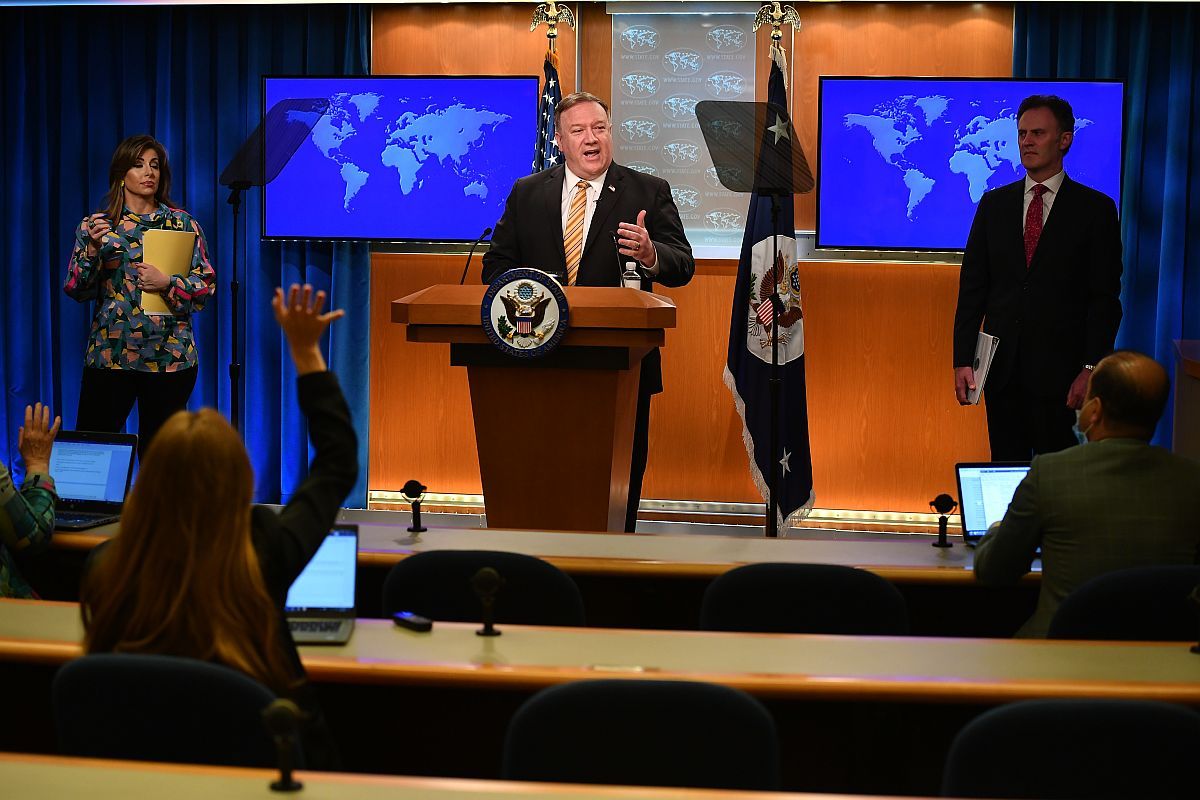As tempers flared in Washington…
Donald Trump and his Vice President JD Vance together targeting Ukrainian President Volodymyr Zelenskky in full media glare is a spectacle not witnessed in years.
Last week, Mike Pompeo had criticised the Chinese Army for ‘escalating’ the border tension with India and militarising the strategic South China Sea.

US Secretary of State Mike Pompeo. (Photo: AFP)
The US is reviewing its global deployment of forces to ensure it is postured appropriately to counter the People’s Liberation Army, given the increasing threat posed by China to Asian countries like India, Malaysia, Indonesia, and the Philippines, Secretary of State Mike Pompeo said on Thursday.
Pompeo made those remarks in response to a question during the virtual Brussels Forum 2020 of the German Marshall Fund.
Advertisement
The threats from China to India and countries in Southeast Asia and the challenges in the South China Sea are going to dictate the allocation of defence resources as US cuts troop levels in Germany, he said.
Advertisement
He added that China’s expansionism is “the challenge of our time” and the US wants to ensure that its resources are in place to meet it.
“We’re going to make sure we’re postured appropriately to counter the PLA. We think that the challenge of our times, and we’re going to make sure we have resources in place to do that,” the US Secretary of State was quoted as saying by PTI.
The force posture review is being done at the direction of President Donald Trump, as part of which the US is reducing the number of its troops in Germany from about 52,000 to 25,000, he said.
Mike Pompeo said that the force posture would be dictated by the ground realities.
During his interactions at the forum, he repeatedly emphasised the multifaceted threats from China.
“In certain places there will be fewer American resources. There’ll be other places – I just talked about the threat from the Chinese Communist Party, so now threats to India, threats to Vietnam, threats to Malaysia, Indonesia, South China Sea challenges, the Philippines,” he said.
“To the extent that that changed, the difference in what the US decided to do impacts adversely a threat some place, it may be that other nations need to step up and take responsibility for their own defense in ways that they hadn’t done previously. So, we want to do this in full consultation with all of our partners all around the world, and certainly our friends in Europe,” Pompeo added.
Pompeo spoke at length about the threats from China to countries around the world and how everyone has been slow to awaken to them.
“But the CCP’s coverup of the coronavirus, an outbreak that began in Wuhan, China – which has now killed tens of thousands of our people, and hundreds of thousands of people across the world – I think it’s accelerated everyone’s awakening,” he said.
“The United States is not forcing Europe to choose between the free world or China’s authoritarian vision. China is making that choice between freedom and democracy,” he said.
“Europeans, like Americans, are starting to find their voice” against China’s aggressiveness, economic manipulation, COVID-19 pandemic coverup and intimidation, he said.
Last week, Mike Pompeo had criticised the Chinese Army for “escalating” the border tension with India and militarising the strategic South China Sea. He also described the ruling Communist Party of China (CPC) as a “rogue actor”.
Launching a scathing attack on the Chinese government, the TP official had said that the Chinese Communist Party wants to undo all the progress the free world has made through institutions like NATO and adopt a new set of rules and norms that accommodate Beijing.
“The PLA (People’s Liberation Army) has escalated border tensions with India, the world’s most populous democracy. It’s militarising the South China Sea and illegally claiming more territory there, threatening vital sea lanes,” said Pompeo, a day after he expressed deep condolences to India on the death of 20 soldiers in violent clashes with Chinese troops at the Galwan Valley in Ladakh on June 15.
Following reports of violence in Ladakh, the United States had voiced hope that the two countries will peacefully resolve differences.
The US State Department also said that it is “closely monitoring” the situation between Indian and Chinese forces along LAC.
US President Donald Trump last month had offered to mediate between India and China, although his administration could not offer further details on what he was proposing.
As many as 20 Indian Armymen including officers were killed in an unprecedented face-off in eastern Ladakh with Chinese People’s Liberation Army soldiers attacking a small group of Indian Army men on patrol on the night of June 15.
Meanwhile, New Delhi has stated that China’s repeated incursions into Indian territory this year has been in “complete disregard” of all “mutually agreed norms”.
In its statement on Thursday, the foreign ministry said: ”Unfortunately, we have experienced in the last many years obstruction to patrolling that often accompany efforts to unilaterally change the status quo… The deployment of large body of troops and changes in behavior has also been aggravated by unjustified and untenable claims. The recent shift in the Chinese position on the Galwan Valley is one example.”
”While there have been occasional departures in the past, the conduct of Chinese forces this year has been in complete disregard of all mutually agreed norms…The Indian side has never undertaken any actions across the LAC and has never attempted to unilaterally change the status quo,” the ministry said in a very strong statement.
(With agency inputs)
Advertisement